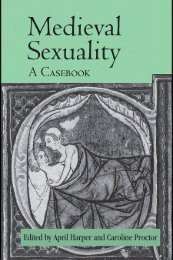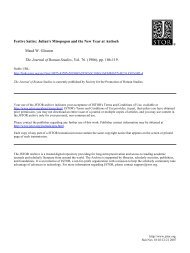- Page 1 and 2:
HISTORIOGRAPHYIN THE MIDDLE AGESDEB
- Page 3 and 4:
This page intentionally left blank
- Page 5 and 6:
This book is printed on acid-free p
- Page 7 and 8:
viCONTENTS11. Biography 1000-1350 .
- Page 9 and 10:
This page intentionally left blank
- Page 11 and 12:
2 DEBORAH MAUSKOPF DELIYANNISMuch o
- Page 13 and 14:
4 DEBORAH MAUSKOPF DELIYANNISbetter
- Page 15 and 16:
6 DEBORAH MAUSKOPF DELIYANNISThe ch
- Page 17 and 18:
8 DEBORAH MAUSKOPF DELIYANNIScritic
- Page 19 and 20:
10 DEBORAH MAUSKOPF DELIYANNIShold,
- Page 21 and 22:
12 DEBORAH MAUSKOPF DELIYANNISnow i
- Page 23 and 24:
This page intentionally left blank
- Page 25 and 26:
This page intentionally left blank
- Page 27 and 28:
18 MICHAEL I. ALLENone, emphasized
- Page 29 and 30:
20 MICHAEL I. ALLENFrom the flux of
- Page 31 and 32:
22 MICHAEL I. ALLENuntil and beyond
- Page 33 and 34:
24 MICHAEL I. ALLENreverse, their l
- Page 35 and 36:
26 MICHAEL I. ALLENwith a new cosmi
- Page 37 and 38:
28 MICHAEL I. ALLENcoincidence of A
- Page 39 and 40:
30 MICHAEL I. ALLENAbraham and God
- Page 41 and 42:
32 MICHAEL I. ALLENAugustine unders
- Page 43 and 44:
34 MICHAEL I. ALLENeffort, Bede mea
- Page 45 and 46:
36 MICHAEL I. ALLENchronology, and
- Page 47 and 48:
38 MICHAEL I. ALLENarticulate his p
- Page 49 and 50:
40 MICHAEL I. ALLENiconoclast Claud
- Page 51 and 52:
42 MICHAEL I. ALLENextent that they
- Page 53 and 54:
44 JOAQUÍN MARTÍNEZ PIZARROself-a
- Page 55 and 56:
46 JOAQUÍN MARTÍNEZ PIZARROritual
- Page 57 and 58:
48 JOAQUÍN MARTÍNEZ PIZARROoffici
- Page 59 and 60:
50 JOAQUÍN MARTÍNEZ PIZARROlong-l
- Page 61 and 62:
52 JOAQUÍN MARTÍNEZ PIZARROGregor
- Page 63 and 64:
54 JOAQUÍN MARTÍNEZ PIZARROrange
- Page 65 and 66:
56 JOAQUÍN MARTÍNEZ PIZARROTestam
- Page 67 and 68:
58 JOAQUÍN MARTÍNEZ PIZARROthe pr
- Page 69 and 70:
60 JOAQUÍN MARTÍNEZ PIZARROSchola
- Page 71 and 72:
62 JOAQUÍN MARTÍNEZ PIZARROsense
- Page 73 and 74:
64 JOAQUÍN MARTÍNEZ PIZARROThe au
- Page 75 and 76:
66 JOAQUÍN MARTÍNEZ PIZARROare in
- Page 77 and 78:
68 JOAQUÍN MARTÍNEZ PIZARROof the
- Page 79 and 80:
70 JOAQUÍN MARTÍNEZ PIZARROto att
- Page 81 and 82:
72 JOAQUÍN MARTÍNEZ PIZARROis the
- Page 83 and 84:
74 JOAQUÍN MARTÍNEZ PIZARROwere c
- Page 85 and 86:
76 JOAQUÍN MARTÍNEZ PIZARRORecent
- Page 87 and 88:
78 JOAQUÍN MARTÍNEZ PIZARROof sec
- Page 89 and 90:
80 JOAQUÍN MARTÍNEZ PIZARROof hig
- Page 91 and 92:
82 JOAQUÍN MARTÍNEZ PIZARROinvolv
- Page 93 and 94:
84 JOAQUÍN MARTÍNEZ PIZARROprofil
- Page 95 and 96:
86 JOAQUÍN MARTÍNEZ PIZARROLombar
- Page 97 and 98:
This page intentionally left blank
- Page 99 and 100:
90 MICHEL SOTAs for institutional h
- Page 101 and 102:
92 MICHEL SOTthe second century, an
- Page 103 and 104:
94 MICHEL SOTdates to a group of en
- Page 105 and 106:
96 MICHEL SOT465), which gathers to
- Page 107 and 108:
98 MICHEL SOTand it has been listed
- Page 109 and 110:
100 MICHEL SOTrather than the refin
- Page 111 and 112:
102 MICHEL SOTMarcellinus Comes, go
- Page 113 and 114:
104 MICHEL SOTthe authors, is only
- Page 115 and 116:
106 MICHEL SOTBut it still belonged
- Page 117 and 118:
108 MICHEL SOTmethod. The bishop An
- Page 119 and 120:
110 MICHEL SOTLocal InformationThe
- Page 121 and 122:
112 MICHEL SOTis oriented based on
- Page 123 and 124:
114 MICHEL SOTnumerous relics of ap
- Page 125 and 126:
116 THOMAS J. HEFFERNANin contrast,
- Page 127 and 128:
118 THOMAS J. HEFFERNANlargely abse
- Page 129 and 130:
120 THOMAS J. HEFFERNANThe Beginnin
- Page 131 and 132:
122 THOMAS J. HEFFERNANThe GospelsW
- Page 133 and 134:
124 THOMAS J. HEFFERNANidentificati
- Page 135 and 136:
126 THOMAS J. HEFFERNANChristian Ep
- Page 137 and 138:
128 THOMAS J. HEFFERNANthe narrativ
- Page 139 and 140:
130 THOMAS J. HEFFERNANIn Eusebius
- Page 141 and 142:
132 THOMAS J. HEFFERNANbrought new
- Page 143 and 144:
134 THOMAS J. HEFFERNANAlthough Chr
- Page 145 and 146:
136 THOMAS J. HEFFERNANtype in his
- Page 147 and 148:
138 THOMAS J. HEFFERNANresignation,
- Page 149 and 150:
140 THOMAS J. HEFFERNANthe praetori
- Page 151 and 152:
142 THOMAS J. HEFFERNANAlthough Odo
- Page 153 and 154:
144 THOMAS J. HEFFERNANso that the
- Page 155 and 156:
146 THOMAS J. HEFFERNANWhat were Gr
- Page 157 and 158:
148 THOMAS J. HEFFERNANperils of an
- Page 159 and 160:
150 THOMAS J. HEFFERNANin the same
- Page 161 and 162:
152 THOMAS J. HEFFERNANthese divine
- Page 163 and 164:
154 THOMAS J. HEFFERNANthrough othe
- Page 165 and 166:
This page intentionally left blank
- Page 167 and 168:
158 ROLF SPRANDELepochs of the worl
- Page 169 and 170:
160 ROLF SPRANDELaforementioned pur
- Page 171 and 172:
162 ROLF SPRANDELwill be described
- Page 173 and 174:
164 ROLF SPRANDELThis goal also is
- Page 175 and 176:
166 ROLF SPRANDELpope section has b
- Page 177 and 178:
168 ROLF SPRANDELbishop and city in
- Page 179 and 180:
170 ROLF SPRANDELThe Cologne world
- Page 181 and 182:
172 ROLF SPRANDELit is a chronicle
- Page 183 and 184:
174 ROLF SPRANDELworld and relies m
- Page 185 and 186:
176 ROLF SPRANDELtaken up by Schede
- Page 187 and 188:
178 ROLF SPRANDELfew who do not fit
- Page 189 and 190:
This page intentionally left blank
- Page 191 and 192:
182 NORBERT KERSKENformulated by Is
- Page 193 and 194:
184 NORBERT KERSKENA few years afte
- Page 195 and 196:
186 NORBERT KERSKENpoint of departu
- Page 197 and 198:
188 NORBERT KERSKENof which (1110/1
- Page 199 and 200:
190 NORBERT KERSKENat Sázava; and,
- Page 201 and 202:
192 NORBERT KERSKENhistoriography o
- Page 203 and 204:
194 NORBERT KERSKENnine books can b
- Page 205 and 206:
196 NORBERT KERSKENMedieval Norway
- Page 207 and 208:
198 NORBERT KERSKENand worked, duri
- Page 209 and 210:
200 NORBERT KERSKENplanis verbis in
- Page 211 and 212:
202 NORBERT KERSKENto the invasion
- Page 213 and 214:
204 NORBERT KERSKENwhich made a con
- Page 215 and 216:
206 NORBERT KERSKENindebted to Vinc
- Page 217 and 218:
208 NORBERT KERSKENof various polit
- Page 219 and 220:
210 NORBERT KERSKENto the accession
- Page 221 and 222:
212 NORBERT KERSKENAt the turn of t
- Page 223 and 224:
214 NORBERT KERSKENHumanistic natio
- Page 225 and 226:
This page intentionally left blank
- Page 227 and 228:
218 LEAH SHOPKOWAnother explanation
- Page 229 and 230:
220 LEAH SHOPKOWThus, when someone
- Page 231 and 232:
222 LEAH SHOPKOWThe genesis of the
- Page 233 and 234:
224 LEAH SHOPKOWThe Distribution of
- Page 235 and 236:
226 LEAH SHOPKOWnot very common unt
- Page 237 and 238:
228 LEAH SHOPKOW“a history withou
- Page 239 and 240:
230 LEAH SHOPKOWchoose another hist
- Page 241 and 242:
232 LEAH SHOPKOWDynastic history al
- Page 243 and 244:
234 LEAH SHOPKOWThe Author-Subject
- Page 245 and 246:
236 LEAH SHOPKOWaddresses Henry II,
- Page 247 and 248:
238 LEAH SHOPKOWconsistent with med
- Page 249 and 250:
240 LEAH SHOPKOWdaughter of Charles
- Page 251 and 252:
242 LEAH SHOPKOWtwo versions, with
- Page 253 and 254:
244 LEAH SHOPKOWfor its patrimony a
- Page 255 and 256:
246 LEAH SHOPKOWwork, the Assises d
- Page 257 and 258:
248 LEAH SHOPKOWthe family chose to
- Page 259 and 260:
250 PETER AINSWORTHis one of the fi
- Page 261 and 262:
252 PETER AINSWORTHEarly Eyewitness
- Page 263 and 264:
254 PETER AINSWORTHenliven his narr
- Page 265 and 266:
256 PETER AINSWORTHAtant es vus ces
- Page 267 and 268:
258 PETER AINSWORTHCrusader Histori
- Page 269 and 270:
260 PETER AINSWORTHAmbroise’s Est
- Page 271 and 272:
262 PETER AINSWORTHof which he had
- Page 273 and 274:
264 PETER AINSWORTHas the romance-l
- Page 275 and 276:
266 PETER AINSWORTHat Les Estinnes-
- Page 277 and 278:
268 PETER AINSWORTHmust have disapp
- Page 279 and 280:
270 PETER AINSWORTHalso—and more
- Page 281 and 282:
272 PETER AINSWORTHGiven that the k
- Page 283 and 284:
274 PETER AINSWORTHwhose likeness h
- Page 285 and 286:
276 PETER AINSWORTHhonest ‘generi
- Page 287 and 288:
278 BERT ROESTThis chapter deals wi
- Page 289 and 290:
280 BERT ROESTMonastic chronicles a
- Page 291 and 292:
282 BERT ROESTwider salvation-histo
- Page 293 and 294:
284 BERT ROESTConstance Proksch eve
- Page 295 and 296:
286 BERT ROESTcatalogues. Normally,
- Page 297 and 298:
288 BERT ROESTIII. Mendicant Histor
- Page 299 and 300:
290 BERT ROESTIII.1Franciscan and D
- Page 301 and 302:
292 BERT ROESTand anecdote collecti
- Page 303 and 304:
294 BERT ROESTtexts were concerned
- Page 305 and 306:
296 BERT ROESTmost renowned followe
- Page 307 and 308:
298 BERT ROESTof smaller Franciscan
- Page 309 and 310:
300 BERT ROESTClareno and his spiri
- Page 311 and 312:
302 BERT ROESTabout the spread of t
- Page 313 and 314:
304 BERT ROESTAnother prolific Domi
- Page 315 and 316:
306 BERT ROESTonwards. 105 Of compa
- Page 317 and 318: 308 BERT ROESTIII.5Other forms of m
- Page 319 and 320: 310 BERT ROESTThese compendia share
- Page 321 and 322: 312 BERT ROESTde mundi aetatibus of
- Page 323 and 324: 314 BERT ROESTremain unedited or ar
- Page 325 and 326: This page intentionally left blank
- Page 327 and 328: 318 AUGUSTO VASINAand to distinguis
- Page 329 and 330: 320 AUGUSTO VASINAthe international
- Page 331 and 332: 322 AUGUSTO VASINAthese proposed bi
- Page 333 and 334: 324 AUGUSTO VASINA1000 to the early
- Page 335 and 336: 326 AUGUSTO VASINABut before analyz
- Page 337 and 338: 328 AUGUSTO VASINAall the way to th
- Page 339 and 340: 330 AUGUSTO VASINApanorama, without
- Page 341 and 342: 332 AUGUSTO VASINAcertainly an inac
- Page 343 and 344: 334 AUGUSTO VASINAmoralistic affirm
- Page 345 and 346: 336 AUGUSTO VASINAabsolutely of ope
- Page 347 and 348: 338 AUGUSTO VASINAProceeding along
- Page 349 and 350: 340 AUGUSTO VASINAnovitates. But in
- Page 351 and 352: 342 AUGUSTO VASINAwith titles attac
- Page 353 and 354: 344 AUGUSTO VASINAcanon of St. Autb
- Page 355 and 356: 346 AUGUSTO VASINAchronicles interr
- Page 357 and 358: 348 AUGUSTO VASINAevents, appear in
- Page 359 and 360: 350 AUGUSTO VASINAwritten sometimes
- Page 361 and 362: 352 AUGUSTO VASINAThe present list
- Page 363 and 364: 354 MICHAEL GOODICHcentury, Matthew
- Page 365 and 366: 356 MICHAEL GOODICHDominican provin
- Page 367: 358 MICHAEL GOODICHentrusted with r
- Page 371 and 372: 362 MICHAEL GOODICHevidence of Eliz
- Page 373 and 374: 364 MICHAEL GOODICHCanonization and
- Page 375 and 376: 366 MICHAEL GOODICHof Hildesheim, W
- Page 377 and 378: 368 MICHAEL GOODICHdated between 13
- Page 379 and 380: 370 MICHAEL GOODICHa different set
- Page 381 and 382: 372 MICHAEL GOODICHoften contained
- Page 383 and 384: 374 MICHAEL GOODICHprivileges and s
- Page 385 and 386: 376 MICHAEL GOODICHthat he had been
- Page 387 and 388: 378 MICHAEL GOODICHIn the late twel
- Page 389 and 390: 380 MICHAEL GOODICHvariety of autho
- Page 391 and 392: 382 MICHAEL GOODICHexample, the 119
- Page 393 and 394: 384 MICHAEL GOODICHMany of the issu
- Page 395 and 396: This page intentionally left blank
- Page 397 and 398: 388 PETER AINSWORTHaccount. The lea
- Page 399 and 400: 390 PETER AINSWORTHsurely have so m
- Page 401 and 402: 392 PETER AINSWORTHname of the Lord
- Page 403 and 404: 394 PETER AINSWORTHthe war a certai
- Page 405 and 406: 396 PETER AINSWORTHHistoriography r
- Page 407 and 408: 398 PETER AINSWORTHlink connecting
- Page 409 and 410: 400 PETER AINSWORTHand 1170), the R
- Page 411 and 412: 402 PETER AINSWORTHisland of ‘Bre
- Page 413 and 414: 404 PETER AINSWORTHHis descriptions
- Page 415 and 416: 406 PETER AINSWORTHDes altres tuz f
- Page 417 and 418: 408 PETER AINSWORTHA jugleours oï
- Page 419 and 420:
410 PETER AINSWORTHof Saint-Quentin
- Page 421 and 422:
412 PETER AINSWORTHseen that it gav
- Page 423 and 424:
414 PETER AINSWORTHA second approac
- Page 425 and 426:
416 PETER AINSWORTHa large degree,
- Page 427 and 428:
418 BIBLIOGRAPHYA. I. Pini, P. Ross
- Page 429 and 430:
420 BIBLIOGRAPHYCorvey”. Pp. 875-
- Page 431 and 432:
422 BIBLIOGRAPHYBurke, P. (1991).
- Page 433 and 434:
424 BIBLIOGRAPHYd’Alatri, M., and
- Page 435 and 436:
426 BIBLIOGRAPHY——. (1985b).
- Page 437 and 438:
428 BIBLIOGRAPHYFuhrmann, H. (1963)
- Page 439 and 440:
430 BIBLIOGRAPHY——. Histoire et
- Page 441 and 442:
432 BIBLIOGRAPHYHofinger, F. (1974)
- Page 443 and 444:
434 BIBLIOGRAPHY——. (1991). “
- Page 445 and 446:
436 BIBLIOGRAPHYMacDonald, A. D. S.
- Page 447 and 448:
438 BIBLIOGRAPHYder territorialen G
- Page 449 and 450:
440 BIBLIOGRAPHYüberlieferungsgesc
- Page 451 and 452:
442 BIBLIOGRAPHYQuéruel, D., ed.,
- Page 453 and 454:
444 BIBLIOGRAPHYSchmidt, H. (1958).
- Page 455 and 456:
446 BIBLIOGRAPHYStaubach, N. (1995)
- Page 457 and 458:
448 BIBLIOGRAPHYVan Dam, R. (1993).
- Page 459 and 460:
450 BIBLIOGRAPHYWenskus, R. (1986).
- Page 461 and 462:
This page intentionally left blank
- Page 463 and 464:
454 INDEXConstantius of Lyon 140-41
- Page 465 and 466:
456 INDEXJulian of Speyer 290, 371J
- Page 467 and 468:
458 INDEXThomas of Loches 235-36Tho
- Page 469 and 470:
460 INDEXFirst Bavarian Supplement
- Page 471 and 472:
INDEX OF TERMSannals 4, 6, 73-75, 1
- Page 473:
464 INDEXverse 202-3, 254, 264-65,













